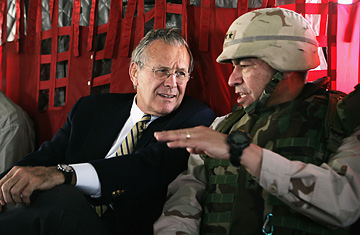
Then Secretary of Defense Donald Rumsfeld talks to Lt. Gen. Ricardo Sanchez, head of Coaltion Forces in Iraq, May 13, 2004.
(2 of 3)
Starting to get a little worked up, I paused a moment, and then looked Rumsfeld straight in the eye. "Sir, I cannot believe that you didn't know I was being left in charge in Iraq."
"No! No!" he replied. "I was never told that the plan was for V Corps to assume the entire mission. I have to issue orders and approve force deployments into the theater, and they moved all these troops around without any orders or notification from me."
"Sir, I don't ... "
"Why didn't you tell anyone about this?" he asked, interrupting me in an angry tone.
"Mr. Secretary, all of the senior leadership in the Pentagon knew what was happening. Franks issued the orders and McKiernan was executing them."
"Well, what about Abizaid? He was the deputy then."
"Sir, General Abizaid knew and worked very hard with me to reverse direction once he assumed command of CENTCOM. General Bell also knew, and he offered to send me his operations officer. In early July, when General Keane visited us, I described to him the wholly inadequate manning level of the staff, and told him that we were set up for failure. He agreed and told me that he would immediately begin to identify general officers to help fill our gaps."
"Yes, yes," replied Rumsfeld. "General Keane is a good man. But this was a major failure and it has to be documented so that we never do it again." He then explained that he would be tasking Adm. Ed Giambastiani, Vice Chairman of the Joint Chiefs, to conduct an inquiry on this issue.
"Well, I think that's appropriate," I said. "That way you'll all be able to understand what was happening on the ground."
"By the way," said Rumsfeld, "why wasn't this in the lessons-learned packages that have been forwarded to my level."
"Sir, I cannot answer that question," I replied. "But this was well known by leadership at multiple levels."
After the meeting ended, I remember walking out of the Pentagon shaking my head and wondering how in the world Rumsfeld could have expected me to believe him. Everybody knew that CENTCOM had issued orders to drawdown the forces. The Department of Defense had printed public affairs guidance for how the military should answer press queries about the redeployment. There were victory parades being planned. And in mid-May 2003, Rumsfeld himself had sent out some of his famous "snowflake" memorandums to Gen. Franks asking how the general was going to redeploy all the forces in Kuwait. The Secretary knew. Everybody knew.
So what was Rumsfeld doing? Nineteen months earlier, in September 2004, when it was clearly established in the Fay-Jones report that CJTF-7 was never adequately manned, he called me in from Europe and claimed ignorance, "I didn't know about it," he said. "How could this happen? Why didn't you tell somebody about it?"
Now, he had done exactly the same thing, only this time he had prepared a written memorandum documenting his denials. So it was clearly a pattern on the Secretary's part, and now I recognized it. Bring in the top-level leaders. Profess total ignorance. Ask why he had not been informed. Try to establish that others were screwing things up. Have witnesses in the room to verify his denials. Put it in writing. In essence, Rumsfeld was covering his rear. He was setting up his chain of denials should his actions ever be questioned. And worse yet, in my mind, he was attempting to level all the blame on his generals.
